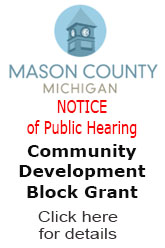 New director, northern Michigan native, used to winter challenges
New director, northern Michigan native, used to winter challenges
By Rob Alway. Editor-in-Chief.
SCOTTVILLE — For the past week, Mason County — and much of the region — has been plagued with extreme winter weather. Blowing snow has meant many county roads are constantly drifted over, making travel difficult.
The crews at the Mason County Road Commission have been working non stop to stay ahead of the drifting, which often seems to be a losing battle.
The storm has been a good test for the road commission’s new manager/director, Wayne Schoonover, who started the position on Jan. 1, replacing Gary Dittmer, who retired from that position (though Dittmer remained on as engineer).
Schoonover is pretty used to winter weather. He grew up near Grayling in the northern Lower Peninsula and went to college at Michigan Tech University in Houghton in the Upper Peninsula. He then spent part of his career working for the Michigan Department of Transportation assisting northern Michigan road commissions.
He said he’s been impressed with the efforts of the MCRC crews.
“We’ve got a fantastic work force with dedicated crews, as demonstrated by the relentless work and actions during the past few weeks,” he said. “There is a lot of potential here and we continue to move things forward.”
Schoonover said the priorities of the road crews is to clear state highways and primary roads first. “Basically, the roads that the most people travel on are the roads that will be cleared first,” he said.
“The problem we have been having is the drifting snow. It doesn’t do a lot of good to clear a small path on a road, because it will be drifted back shut within a short time afterwards. So more time is needed to widen the road. The plow drivers are only human and need to take a break.”
He said the MCRC employees have seen a lot of overtime this winter. Compared to the winter of 2012-2013, the commission has already spent an additional $269,000 to date on road maintenance. Last winter, to date, it spent $182,000 and this year it has already spent $451,000.
“Our top priority at this point is snow removal and we will clear the roads. It may mean we will need to re-access our priorities later in the spring and put some other projects on hold.”
One of the concerns of readers has been what happens in case of an emergency. Many people said they have had difficulties traveling from their homes since last Thursday.
Schoonover said the road commission is staffed 24 hours a day. While overnight crews may be limited to clearing state highways and primary roads, they will be diverted to clear the path of emergency vehicles.
“Our crews are in contact with Mason-Oceana 911,” he said. “If there is an emergency, they are aware of it.”
Schoonover began his career with MDOT. After 11 years there, he worked as an engineer for the Ionia County Road Commission for 12 years. He spent a short stint working at Berrien County Road Commission and then most recently was the interim director of Manistee Road Commission.
He said Mason County’s road commission works with the minimum crew it can afford, but they work very efficiently.
“Though Ionia County is a larger county by population, we have comparable numbers of personnel here,” he said.
There are 28 maintenance personnel working the roads and keeping the equipment operational, along with five administrative personnel. The MCRC has 23 trucks and 3 motor graters.
The road commission is funded differently than other local entities. Under Michigan Act 51, state roads and bridges are funded by a 19 cent tax on gas (the federal government also funds roads and bridges with a 19 cent gas tax). A formula divvies up the funds between MDOT, county road commissions and cities and villages. The commission is governed by a 3-member autonomous board that is appointed by the county commission.
“In 1919 the voters of Michigan voted to separate road commissions from other local governments,” Schoonover. “This was done with the intention of keeping politics out of roads. Everybody should be able to drive on the roads equally.”
Road commission meetings are public and fall under the Open Meetings Act.
“I think we have a good board that is policy minded.”
As for Schoonover, he said he is looking forward to utilizing more technology into the road commission, with the goal of increasing efficiency.



















.jpg)























 (1).gif)











.png)







